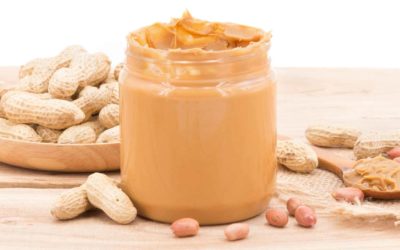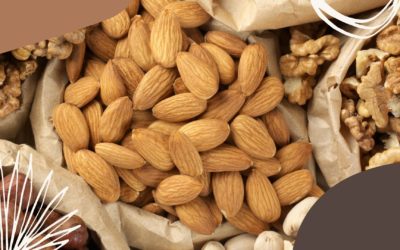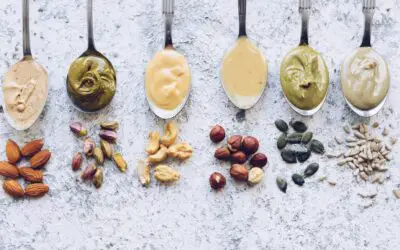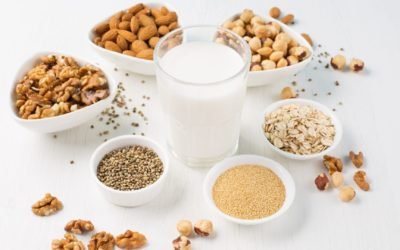Nuts are often considered one of nature’s perfect foods. They are not only delicious but also packed with essential nutrients that benefit our overall health. While nuts are known for their healthy fats, they also provide an excellent source of plant-based protein, making them a valuable addition to any diet. In this article, we will explore the nuts that are high in protein, their nutritional benefits, and the various ways you can incorporate them into your diet for a healthier lifestyle.
What is Protein?
Protein is a fundamental macronutrient that plays a critical role in the structure, function, and regulation of the human body. It is composed of long chains of amino acids, which are organic molecules that serve as the building blocks of life. These amino acids link together in various sequences to form a wide range of proteins, each with its unique structure and function. There are 20 different amino acids that can combine in different ways, allowing the human body to produce an incredible diversity of proteins.
Why is Protein Important for the Body?
Proteins are involved in a multitude of essential functions within the body. They provide the structural framework for cells, tissues, and organs, and are crucial for muscle development and repair. Enzymes, which are specialized proteins, act as catalysts for chemical reactions in the body, speeding up vital processes like digestion and metabolism.
Additionally, proteins are involved in immune system function, serving as antibodies to defend against infections, and they also transport molecules throughout the body, play a role in hormone regulation, and can act as a source of energy when necessary. In summary, proteins are integral to nearly every aspect of human biology and are a cornerstone of a healthy, functioning body.
Nuts That Are High In Protein
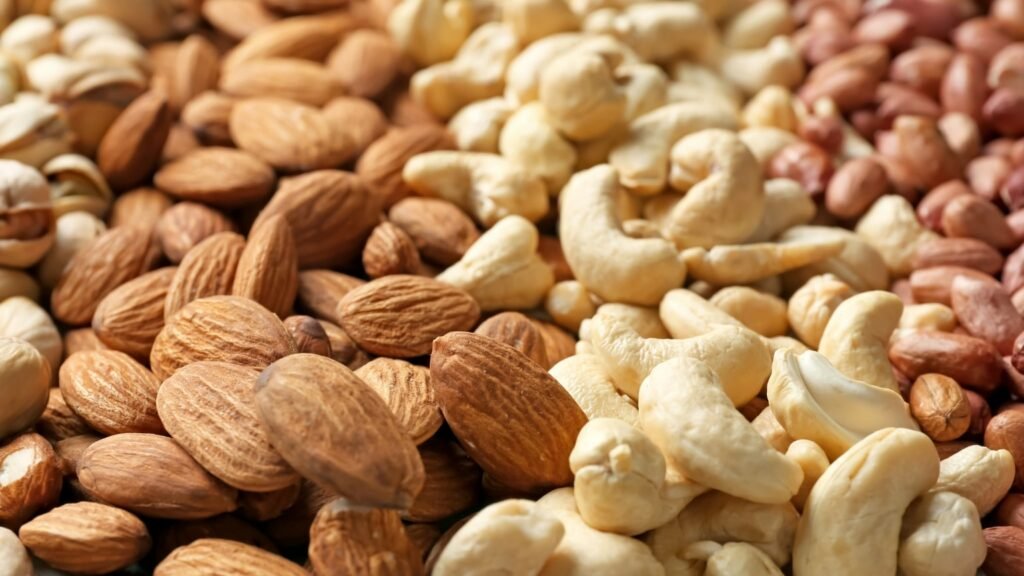
Is almond nuts high in protein?
Almonds are one of the highest protein-containing nuts, providing approximately 6 grams of protein per 1-ounce (28-gram) serving. Almonds are also a rich source of healthy fats, fiber, vitamins (such as vitamin E and B vitamins), and minerals (like magnesium). They are known to support heart health, aid in weight management, and provide a boost of energy.
Peanuts
Peanuts are technically legumes, but they share similar nutritional characteristics with tree nuts. They offer approximately 7 grams of protein per 1-ounce serving. Peanuts are an excellent source of monounsaturated fats, fiber, vitamin E, and folate. They have been associated with reduced risk of heart disease and improved weight control.
Pistachios
Pistachios contain around 6 grams of protein per 1-ounce serving. These green gems are packed with healthy fats, fiber, and a variety of essential nutrients, such as vitamin B6, potassium, and antioxidants. Pistachios have been linked to improved heart health, weight management, and better blood sugar control.
Cashews
Cashews offer about 5 grams of protein per 1-ounce serving. Cashews are loaded with healthy monounsaturated fats, vitamins (like vitamin K and B vitamins), and minerals (including copper and magnesium). They support bone health, aid in brain function, and have anti-inflammatory properties.
Walnuts
Walnuts provide around 4 grams of protein per 1-ounce serving. Walnuts are a fantastic source of omega-3 fatty acids, which are crucial for heart health and brain function. They are also rich in antioxidants and can help reduce inflammation in the body.
Hazelnuts
Hazelnuts contain approximately 4 grams of protein per 1-ounce serving. Hazelnuts are a good source of dietary fiber, healthy fats, vitamin E, and several essential minerals. They contribute to heart health, improved digestion, and radiant skin.
Pecans
Pecans offer about 3 grams of protein per 1-ounce serving. Pecans are abundant in healthy fats, dietary fiber, and an array of vitamins and minerals, including vitamin A, vitamin E, and potassium. They can help lower cholesterol levels and support eye health.
Can you get enough protein from nuts?
While nuts are indeed a good source of protein, it can be challenging to get all the protein your body needs solely from nuts, especially if you have high protein requirements or follow a strict vegetarian or vegan diet. Nuts typically contain around 5-7 grams of protein per 1-ounce serving, and while this can contribute to your daily protein intake, it may not be sufficient to meet your entire protein needs.
Factors such as age, sex, activity level, and overall dietary choices influence your daily protein requirements. For example, athletes and bodybuilders often have higher protein needs, and relying solely on nuts may not be practical. It’s essential to diversify your protein sources to ensure you get a balanced intake of all the essential amino acids your body needs for optimal functioning.
To meet your protein needs more effectively, consider incorporating other protein-rich foods into your diet, such as legumes (e.g., beans, lentils), tofu, tempeh, dairy products, eggs, and lean meats if you’re not vegetarian or vegan. These sources can complement the protein provided by nuts, allowing you to attain a well-rounded and complete protein intake.
Balancing your diet with a variety of protein sources ensures that you obtain a broader spectrum of essential nutrients, and it can be a more sustainable approach to meeting your protein requirements while enjoying the numerous health benefits that various foods can offer.
Are nuts better than meat for protein?
Whether nuts are better than meat for protein depends on your dietary preferences, nutritional needs, and health goals. Nuts are a fantastic source of plant-based protein, offering various health benefits such as heart-healthy fats, dietary fiber, and essential vitamins and minerals. They are particularly valuable for individuals following vegetarian or vegan diets, providing a protein source that aligns with their dietary choices. Nuts also have a lower environmental impact compared to meat production, making them a more sustainable option for those concerned about the ecological footprint of their diet.
Meat, on the other hand, is a highly concentrated source of protein, providing all essential amino acids in one package. For individuals who include meat in their diet, it can be a convenient and efficient way to meet their protein requirements. However, it’s crucial to consider the potential health drawbacks associated with excessive meat consumption, such as saturated fat and cholesterol content, which can contribute to heart disease and other health issues. Choosing lean cuts and practicing moderation is advisable when incorporating meat into your diet.
Which nut is best for muscle gain?
When it comes to building muscle, certain nuts stand out due to their nutritional profiles. Almonds and peanuts are often considered some of the best nuts for muscle gain.
Almonds are high in protein, healthy fats, and essential nutrients like magnesium and vitamin E, making them an excellent choice for promoting muscle growth and recovery. They also provide a good balance of macronutrients, with approximately 6 grams of protein in a 1-ounce serving. Almonds can be a valuable post-workout snack or added to a protein shake to support muscle repair and growth.
Peanuts, while technically legumes, share many nutritional similarities with nuts and are a strong contender for muscle gain. They are rich in both protein and healthy fats, offering around 7 grams of protein per 1-ounce serving. Peanuts are also abundant in amino acids, which are the building blocks of protein, making them an excellent choice for those looking to support muscle development.
However, it’s important to consume these nuts in moderation, as they are calorie-dense, and overindulging may lead to excessive calorie intake, potentially affecting weight management goals. Incorporating these nuts into your diet, alongside other protein sources and a well-structured workout routine, can contribute to muscle gain and overall fitness.
Is it OK to eat nuts everyday?
Yes, it is generally okay to eat nuts every day as part of a balanced diet. Nuts are a nutrient-dense food packed with healthy fats, protein, dietary fiber, vitamins, and minerals that offer numerous health benefits. They can contribute to heart health, aid in weight management, and provide essential nutrients.
However, it’s crucial to practice portion control, as nuts are calorie-dense, and excessive consumption can lead to unintended weight gain. Aim for a handful of nuts (about 1-ounce or 28 grams) per day, and try to diversify the types of nuts you consume to maximize the range of nutrients you receive. Incorporating nuts into a well-rounded diet can be a valuable component of a healthy lifestyle.
Are mixed nuts high in protein?
Yes, mixed nuts are relatively high in protein. Mixed nuts typically consist of a combination of various nuts like almonds, cashews, walnuts, and peanuts. The protein content in mixed nuts can vary depending on the specific blend, but on average, you can expect to get around 5-6 grams of protein per 1-ounce (28-gram) serving of mixed nuts.
Ways to Incorporate Protein-Rich Nuts Into Your Diet
Snacking
Nuts make for a convenient and satisfying snack. A small handful of your favorite protein-rich nuts can keep hunger at bay and provide a much-needed energy boost during the day.
Nut Butter
Nut butter, such as almond, peanut, or cashew butter, can be spread on whole-grain toast, used as a dip for fruits and vegetables, or added to smoothies for a creamy, protein-rich twist.
Salads
Toss a handful of crushed nuts into your salads for added crunch and protein. They pair exceptionally well with leafy greens, fruits, and a drizzle of vinaigrette.
Baking
You can incorporate nuts into your baking recipes, such as muffins, cookies, and granola bars. The addition of chopped nuts provides texture, flavor, and a protein boost.
Breakfast
Sprinkle nuts on top of your morning cereal, yogurt, or oatmeal. This will not only add a delightful crunch but also infuse your breakfast with essential nutrients.
Nut-encrusted Proteins
Crushed nuts can serve as a tasty and protein-rich coating for meats and fish. Baking or pan-frying with a nut crust adds a unique and flavorful dimension to your dishes.
Conclusion
Nuts that are high in protein are a treasure trove of nutrition. They offer a multitude of health benefits, including heart health, weight management, and brain function support, among many others. Incorporating these protein-rich nuts into your diet is not only simple but also delightful, as they can be enjoyed in a variety of ways. Make them a staple in your daily meals and snacks to enhance your overall health and well-being. Whether you choose almonds, peanuts, pistachios, or any of the other nutritious options, these tiny powerhouses are sure to make a big impact on your health and vitality.

